Confused by the overwhelming number of options for preventing heartworm, fleas, and intestinal worms in your dog? This comprehensive guide will walk you through the best available treatments, including common, safe, and vet-recommended products you’ll find at your local veterinary clinic or pet supply store. We’ll focus on helping you choose the Best Wormer And Flea Treatment For Dogs based on their individual needs.
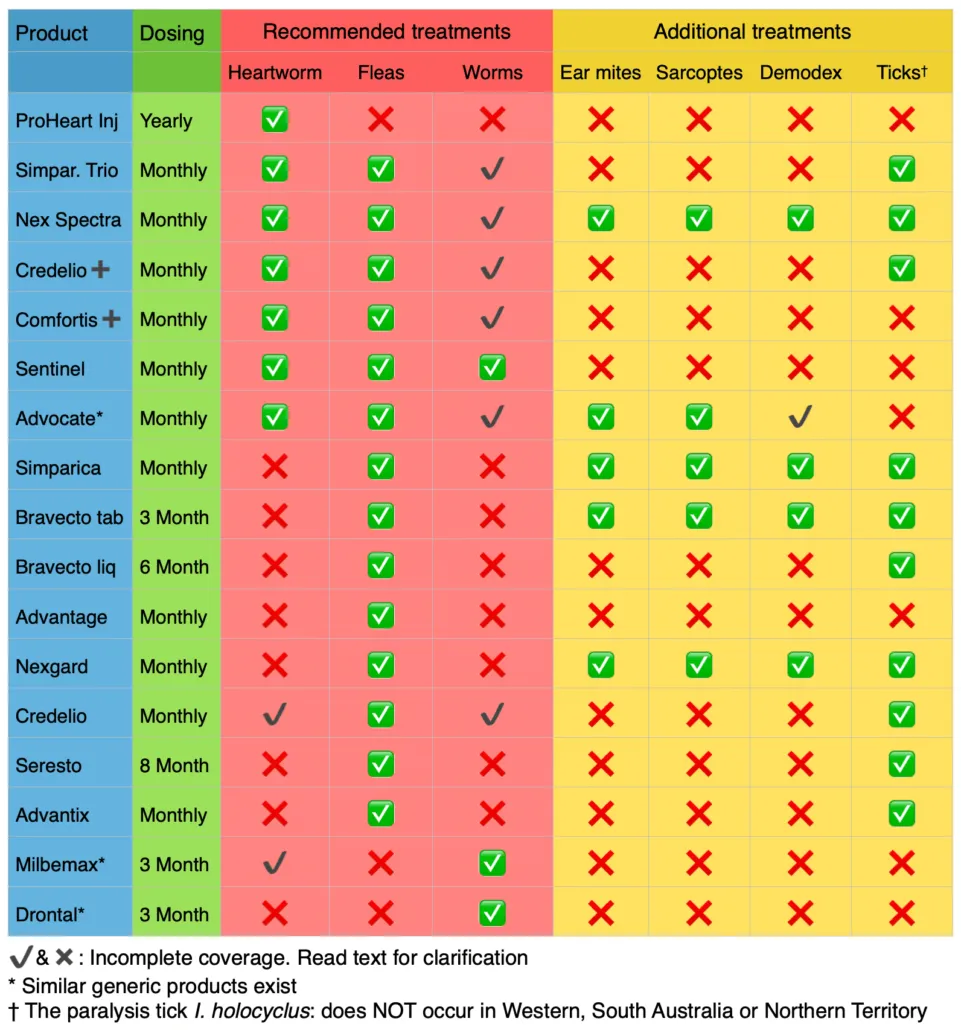 dog flea tick optionsThis chart provides a general overview of various products. Those that offer protection against parasites highlighted in RED are generally considered essential for all dogs. While you could opt for a single treatment covering everything, we recommend a more tailored approach based on understanding each product’s benefits and limitations.
dog flea tick optionsThis chart provides a general overview of various products. Those that offer protection against parasites highlighted in RED are generally considered essential for all dogs. While you could opt for a single treatment covering everything, we recommend a more tailored approach based on understanding each product’s benefits and limitations.
This list is ordered based on our recommendations. However, always consult your veterinarian for personalized advice before starting any new treatment for your pet. Avoid overlapping treatments; for example, if you choose a product like Revolution (or its equivalents), additional flea control isn’t necessary.
Generally, most flea, heartworm, and worming programs from reputable brands will have similar overall costs.
Heartworm Prevention Options for Dogs
Important Note: Monthly tablets or chews containing ivermectin (often found in supermarkets) should never be used in Australian Shepherds, Collies, or Collie cross breeds due to potential MDR1 gene mutations. Always test your dog for existing heartworm infection before starting any preventative treatment.
Proheart® SR12: Once-a-Year Heartworm Injection {#proheart}
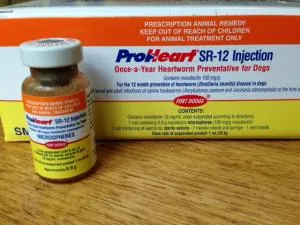 annual heartworm injection
annual heartworm injection
Prevents: Heartworm only
Form: Annual injection (moxidectin)
- A popular choice for consistent heartworm prevention
- Provides continuous protection
- Eliminates the need for remembering monthly doses
- Safe for dogs that have missed previous preventative treatments
- Safe for breeding dogs, during pregnancy, and lactation
- Veterinary clinics often offer reminders for annual injections
Proheart Injectable offers long-term heartworm protection (and short-term hookworm protection). Dogs receiving Proheart still require monthly flea control and worming tablets every three months for intestinal worms. The main benefit is the peace of mind knowing your dog is protected against a life-threatening disease.
How to Use Proheart
We recommend starting Proheart at 6 months of age, aligning the next injection with your dog’s annual vaccination schedule. It can be started at any time, with subsequent injections due annually. Proheart has been tested on breeding dogs and is safe even for dogs carrying heartworm (although prior testing is still recommended).
Simparica® Trio: Monthly Chewable {#simptrio}
Prevents: Heartworm, Fleas, Intestinal worms (excluding tapeworm)
Form: Flavored chew, once monthly (sarolaner, moxidectin & pyrantel)
- Effective flea control combined with heartworm prevention
- Does not treat tapeworms; intestinal wormers are still necessary
- No bathing restrictions
- Effective against paralysis ticks
How to Use Simparica Trio
Simparica Trio can be used in puppies from 8 weeks of age and weighing over 2.75 lbs (1.25kg). Safety hasn’t been evaluated in pregnant, breeding, or lactating dogs.
Nexgard® Spectra: Monthly Meaty Chew {#spectra}
Prevents: Heartworm, Fleas, Intestinal worms (excluding tapeworm)
Form: Meaty chew, once monthly (afoxolaner & milbemycin)
- Highly effective flea control with heartworm prevention
- Also treats mange caused by demodex and sarcoptes mites and ear mites
- Does not treat tapeworms; intestinal wormers are still needed
- No bathing restrictions
- Effective against paralysis ticks
How to Use Nexgard Spectra
Nexgard Spectra can be used from 8 weeks of age in animals weighing over 4.4 lbs (2kg). It’s safe for breeding, pregnant, and lactating females. Safety in breeding males hasn’t been evaluated.
Credelio Plus®: Monthly Chewable for Fleas, Ticks, and Heartworm {#credelioplus}
Prevents: Fleas, Ticks, Heartworm
Form: Meaty chew, once monthly (lotilaner, milbemycin)
- Prevents heartworm disease
- Highly effective flea control
- Effective against paralysis ticks
- No bathing restrictions
- Use with caution in dogs with a history of seizures
How to Use Credelio Plus
Credelio Plus can be used from 8 weeks of age in animals weighing over 3 lbs (1.4 kg). Safety hasn’t been evaluated in pregnant, breeding, or lactating dogs.
Comfortis® Plus (previously Panoramis): Monthly Tablet {#panoramis}
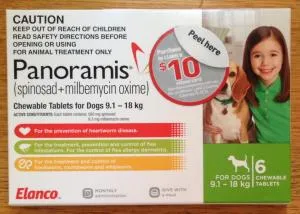 panoramis for dogs
panoramis for dogs
Prevents: Heartworm, Fleas, Intestinal worms (excluding tapeworm)
Form: Tablet, given monthly with food (spinosad & milbemycin)
- Effective flea and heartworm control
- No bathing restrictions
- *Tapewormer recommended every 6 months
- Not recommended for Collies or Australian Shepherds
If administering tablets is difficult, consider Revolution (or equivalents). If you’re concerned about missing monthly doses, Proheart SR-12 (annual injection) for heartworm, Comfortis for fleas, and Milbemax for intestinal worms might be a better option.
How to Use Comfortis Plus
Comfortis Plus can be used from 14 weeks of age. There is a serious interaction with off-label doses of ivermectin so inform your vet if your dog needs mite treatment. Dogs who have missed prevention and may have heartworm require a blood test before starting. Safety in breeding, pregnancy and lactation not established.
Sentinel®: Monthly Tablet {#sentinel}
Prevents: Heartworm, Fleas (flea eggs), Intestinal worms
Form: Tablet, given monthly with food (milbemycin, lufenuron & praziquantel)
- No bathing restrictions
- Safe for young animals
The flea control method sterilizes fleas, rather than killing adult fleas. Dogs in heavily flea-infested areas may need additional treatments. Shown to be safe in pregnancy and lactation.
How to Use Sentinel
Sentinel is safe for puppies from 6 weeks of age and for breeding dogs. Dogs who have missed prevention and may have heartworm require a blood test before starting.
Advocate®: Monthly Topical Liquid {#advocate}
Prevents: Heartworm, Fleas, some intestinal worms, most mites
Form: Topical liquid applied monthly to the back of the neck (moxidectin & imidacloprid)
- Rapid flea control
- Treats ear mites and sarcoptic mange in puppies and dogs
- Aids in the control of demodectic mange
How to Use Advocate
Advocate can be used from 7 weeks of age. Bathing is allowed after 48 hours, but frequent bathing might reduce flea control effectiveness. Also give intestinal worming tablets every 3 months. The solvent may damage clothing and painted surfaces so take care after applying it, and avoid placing it where the animal can lick. We have also seen coat colour change. Dogs who have missed prevention and may have heartworm require a blood test before starting. Safety in pregnancy has not been established.
Flea Prevention (Without Heartworm Prevention)
These products are used alongside a heartworm preventative and intestinal wormer. All cats and dogs in the household must be treated for fleas.
Systemic (tablet) treatments are more environmentally friendly than topical (spot-on) options. Important: Never use products made for dogs on cats, rabbits, or ferrets.
Simparica®: Monthly Tablet for Fleas, Ticks, and Mites {#simparica}
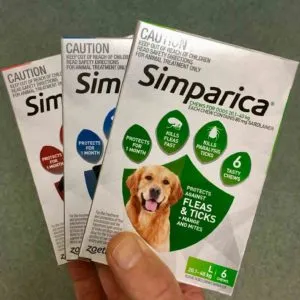 simparica flea mite tick
simparica flea mite tick
Prevents: Fleas, Mites, Ticks
Form: Tablet, once monthly (sarolaner)
- Effective flea control
- No bathing restrictions
- Treats demodectic mange
- Treats sarcoptic mange and ear mites
- Effective against paralysis ticks
How to Use Simparica
Simparica can be used from 8 weeks of age in puppies and dogs over 2.8 lbs (1.3kg). Safety hasn’t been evaluated in breeding, pregnant, or lactating dogs.
Bravecto®: Long-Lasting Flea and Tick Control {#bravecto}
Prevents: Fleas, Ticks
Forms:
Chewable tablet: once every 3 months with food (fluralaner)
Spot-on pipette: every 6 months (fluralaner)
- Long-lasting flea control
- Controls paralysis ticks for 4 months (chew) or 6 months (spot-on)
- Treats dogs up to 123 lbs (56kg)
- The chew also treats demodectic & sarcoptic mange and ear mites
- Safe in breeding, pregnant and lactating animals
How to Use Bravecto
Bravecto can be used from 8 weeks of age from 4.4 lbs (2kg) bodyweight. Give at a mealtime.
Advantage®: Monthly Topical Liquid {#advantage}
Prevents: Fleas
Form: Topical liquid applied monthly to the back of the neck (imidacloprid)
- Fast, effective flea control
- Reliable performance
How to Use Advantage
 discolouration from flea treatment
discolouration from flea treatment
Advantage can be used from weaning. Bathing is allowed after 48 hours, but frequent bathing might reduce flea control effectiveness. The solvent may damage clothing and painted surfaces so take care after applying it, and avoid placing it where the animal can lick. The image shows permanent hair colour change that occurred at the site of application in one dog.
Nexgard®: Monthly Meaty Chew for Flea Control {#nexgard}
Prevents: Fleas
Form: Meaty chew, once monthly (afoxolaner)
- Highly effective flea control
- No bathing restrictions
- Effective against paralysis ticks
- Use with caution in dogs with a history of seizures
How to Use Nexgard
Nexgard can be used from 8 weeks of age in animals over 4.4 lbs (2kg). NexGard can be used in breeding, pregnant and lactating females. Safety in breeding males has not been evaluated.
Credelio®: Monthly Meaty Chew for Flea Control {#credelio}
Prevents: Fleas
Form: Meaty chew, once monthly (lotilaner)
- Highly effective flea control
- No bathing restrictions
- Effective against paralysis ticks
- Use with caution in dogs with a history of seizures
How to Use Credelio
Credelio can be used from 8 weeks of age in animals over 2.8 lbs (1.3 kg). Safety hasn’t been evaluated in pregnant, breeding, or lactating dogs.
Seresto®: Flea and Tick Collar {#seresto}
Prevents: Fleas & Ticks
Form: Insecticide-impregnated collar (imidacloprid & flumethrin)
- Flea control for 8 months and tick control for 4 months
How to Use Seresto
Seresto can be used from 7 weeks of age. Safety in pregnancy has not been established.
Advantix®: Monthly Topical Liquid for Fleas and Ticks {#advantix}
Prevents: Fleas & Ticks
Form: Topical liquid applied monthly to the back of the neck (imidacloprid & permethrin)
- Flea control for 1 month and tick prevention for 2 weeks
- Very toxic to cats
- May have a unique fly and mosquito repellent effect
- Safe for use on pregnant and lactating bitches
How to Use Advantix
Advantix can be used from 7 weeks of age.
Intestinal Worm Treatments for Dogs
There are four important intestinal worms: roundworm, hookworm, whipworm and tapeworm.
Many wormers are available, and most are reasonably effective. Look for two or more active ingredients including at least ‘praziquantel’ plus one other. Always worm all the adult dogs in a house at the same time.
Worming is necessary every two weeks until 12 weeks of age, then every month until 6 months old, then every three months for life. Dogs in hydatid tapeworm areas (usually rural) should be wormed every 6 weeks. It is a requirement of taking your dog to Tasmania that you provide evidence they received a praziquantel dose within 14 days of entry.
Milpro®, Milbemax® etc: Intestinal Worm Tablet {#milbemax}
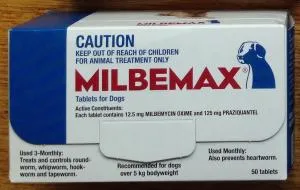 milbemax dog wormer
milbemax dog wormer
Prevents: Intestinal worms
Form: Tablet (milbemycin & praziquantel)
- Small tablets easily hidden in food
- Single tablet treats up to 55 lbs (25kg) dog
- Effective worming
- Can also be used for heartworm control if given monthly
How to Use Milpro
Follow the schedule listed above. Do not use in dogs who may have heartworm without blood testing first. Safe in pregnant bitches.
Drontal®: All-Wormer Tablet {#drontal}
Prevents: Intestinal worms
Form: Tablet, drops, flavoured chews (various)
- Original brand name all-wormer
- Effective worming
- Many generic similar formulations exist
How to Use Drontal
Follow the schedule listed above. Safe in pregnancy.
